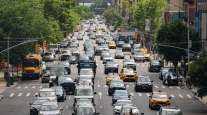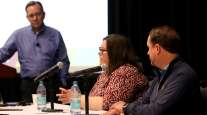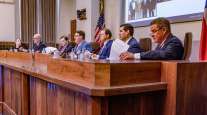To Toll or Not to Toll Is Question for Trump Infrastructure Plan

The Brent Spence Bridge between Ohio and Kentucky carries twice as much traffic as it was built to handle — it’s 54 years old and functionally obsolete.
But an effort to replace the span on one of America’s busiest trucking routes has languished for years — even after governors from both states agreed on a $2.5 billion plan about five years ago. The reason: Kentucky won’t approve new tolls needed to attract private money to the project.
“Everybody wants to use the nebulous phrase, ‘Let’s look at other sources,’ " said former Kentucky Gov. Steve Beshear, who left office in 2015. “But there are no other sources. They just want to keep from saying the word ‘tolls.’ "
The case illustrates a challenge for President Trump’s promise to put $550 billion or more into a 10-year program of upgrading interstate highways, bridges, railways, ports and other public facilities: How can he tap the private capital that his aides have said could help finance the spending?
RELATED: Americans want to rebuild roads, bridges but not at cost of taxes, poll shows
Consultants and investors say there’s plenty of private funding to be had, but it comes at a cost: There has to be a predictable revenue stream — such as user fees or tolls — to provide a reasonable return on investment.
While infrastructure advocates including former Transportation Secretary Ray LaHood say tolling must be part of Trump’s proposal, tolls remain a tough sell. Even before Trump details his plan, an alliance that includes McDonald’s, UPS and all 50 state trucking associations is ready to fight any attempt to expand the use of levies or relax a 1958 restriction on tolling existing interstates.
UPS ranks No. 1 on the Transport Topics Top 100 list of the largest U.S. and Canadian for-hire carriers.
“From a policy perspective, tolling makes a lot of sense,’’ said Jonathan Gifford, director of the Center for Transportation Public-Private Partnership Policy at George Mason University. “It’s a heavy lift to say to the public, to elected officials, ‘We’re now going to start imposing a toll to improve a facility that you’ve been using without paying tolls for decades.’ ’’
RELATED: Wisconsin DOT study finds tolls would raise billions for state highways, boost travel costs
Trump hasn’t said how he’d fund the initiative, though there are indications that private funding would play a significant role. Elaine Chao, Trump’s pick for transportation secretary, said during her Jan. 11 confirmation hearing that a “bold new vision’’ is needed to “take full advantage of the estimated trillions in capital that equity firms, pension funds and endowments can invest’’ in infrastructure.
Top advisers to Trump have floated some possibilities. Steven Mnuchin, his nominee for Treasury secretary, has suggested creating an infrastructure bank, though some congressional Republicans oppose the idea, and Trump himself criticized it during the campaign when Democrat Hillary Clinton proposed it.
In an Oct. 27 paper, Wilbur Ross, the nominee for secretary of commerce, and Peter Navarro, the head of the new White House National Trade Council, called for a new tax credit to attract private funds. They argued that credits totaling $137 billion could leverage $1 trillion in private investment.
RELATED: Former Gov. Ed Rendell - new tolls on interstates ideal for infrastructure projects
Even with a large investor tax credit, private investment — through debt or equity — will still depend on establishing a dedicated funding stream, such as customer payments for a water system or tolls for roads and bridges, said Bryan Grote of Mercator Advisors, which provides consultant services on infrastructure projects.
“I don’t really think there’s going to be much point to a large financing scheme if you’re not addressing the underlying revenue problem, especially tolls, if you’re really focused on private equity,’’ Grote said.
A report last year by the American Society of Civil Engineers, which advocates for increased infrastructure spending, found a $1.4 trillion funding gap through 2025 in aviation, electricity, bridges, roads, drinking water and other areas. The U.S. economy will lose almost $4 trillion and 2.5 million jobs if it doesn’t address those needs, the group said.
Any infrastructure initiative should include rebuilding and expanding U.S. interstates, constructed in the 1950s, and addressing the almost 58,500 structurally deficient bridges, said Robert Poole, director of transportation policy at the Reason Foundation, a nonprofit in Los Angeles that advocates for free markets. To do so, Congress would need to give states the opportunity to levy tolls on existing federal interstates, a practice which is prohibited in current law, he said.
RELATED: Louisiana transportation chief says taxpayers face 'sticker shock' on road and bridge needs
Poole estimated in a 2013 study that $589 billion in 2010 dollars is needed to rebuild U.S. interstates and another $394 billion for lane additions.
Advocates of tolling — including the International Bridge, Tunnel and Turnpike Association in Washington, which represents 210 tolling entities and vendors in 20 countries — want Trump and Congress to consider lifting the 1958 ban on tolling interstates.
Darrin Roth of American Trucking Associations argues that would be more costly and less efficient than traditional taxing methods. His group is lobbying against any expansion of tolls as part of broader coalition in Washington — the Alliance for Toll-Free Interstates, which has more than 2,900 members, including trucking companies, chain restaurants and transportation firms.
Roth already has some advocates on Capitol Hill. Rep. Peter DeFazio, the top Democrat on the House Committee on Transportation and Infrastructure, said that while tolls for new infrastructure makes sense, the public won’t accept new levies on upgraded roads and bridges they’ve used for years.
“Not only did they pay for their interstate, not only are they paying a gas tax, they’re now paying a toll to see their interstate repaired,’’ DeFazio said. “It’s not going to work.”
A Washington Post-ABC News national poll released Jan. 17 found that 66% of those surveyed said they oppose a plan that would involve using tolls to attract more private investment for infrastructure.
Democrats such as DeFazio say public spending on roads should come in part from a higher gasoline tax, which hasn’t been raised since 1993. Meanwhile, Republican House Speaker Paul Ryan and Senate Majority Leader Mitch McConnell have said they don’t support new spending on infrastructure without offsetting budget cuts, which could come as part of a budget or tax-reform measure. Speaking to PBS’s Charlie Rose on Jan. 18, Ryan said he wants a $1 trillion package that has $40 of private-sector spending for each additional federal dollar.
LaHood, the former Republican U.S. transportation secretary under President Barack Obama, said the best chance to achieve a major infrastructure initiative is to draw on multiple funding sources, including raising the gas tax and tolls. And, LaHood said, Trump would need to make the measure one of his top three initiatives to get the support he’d need.
“The leadership has to come from the White House,’’ LaHood said. “He has a lot of political capital. The $64 billion question is, how will he use it?’’




